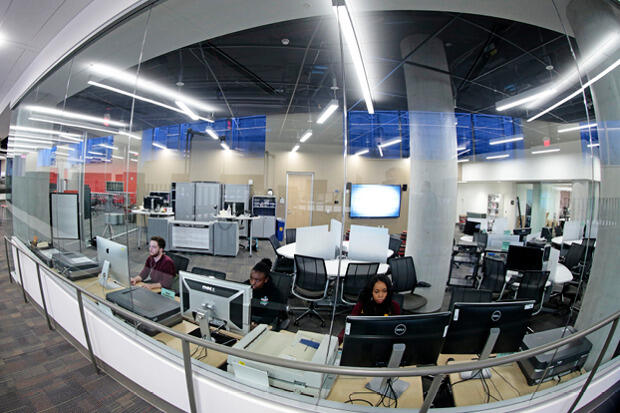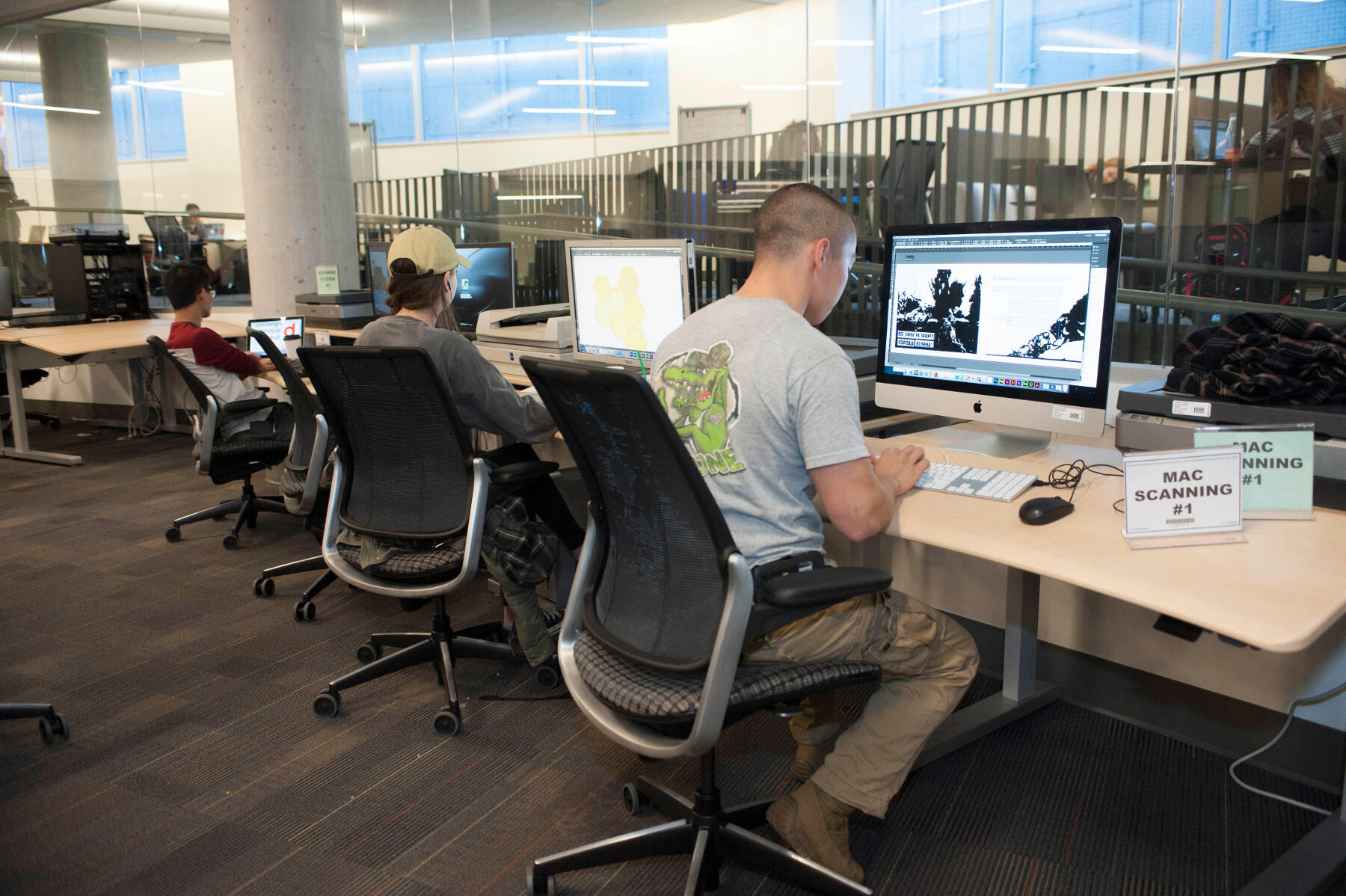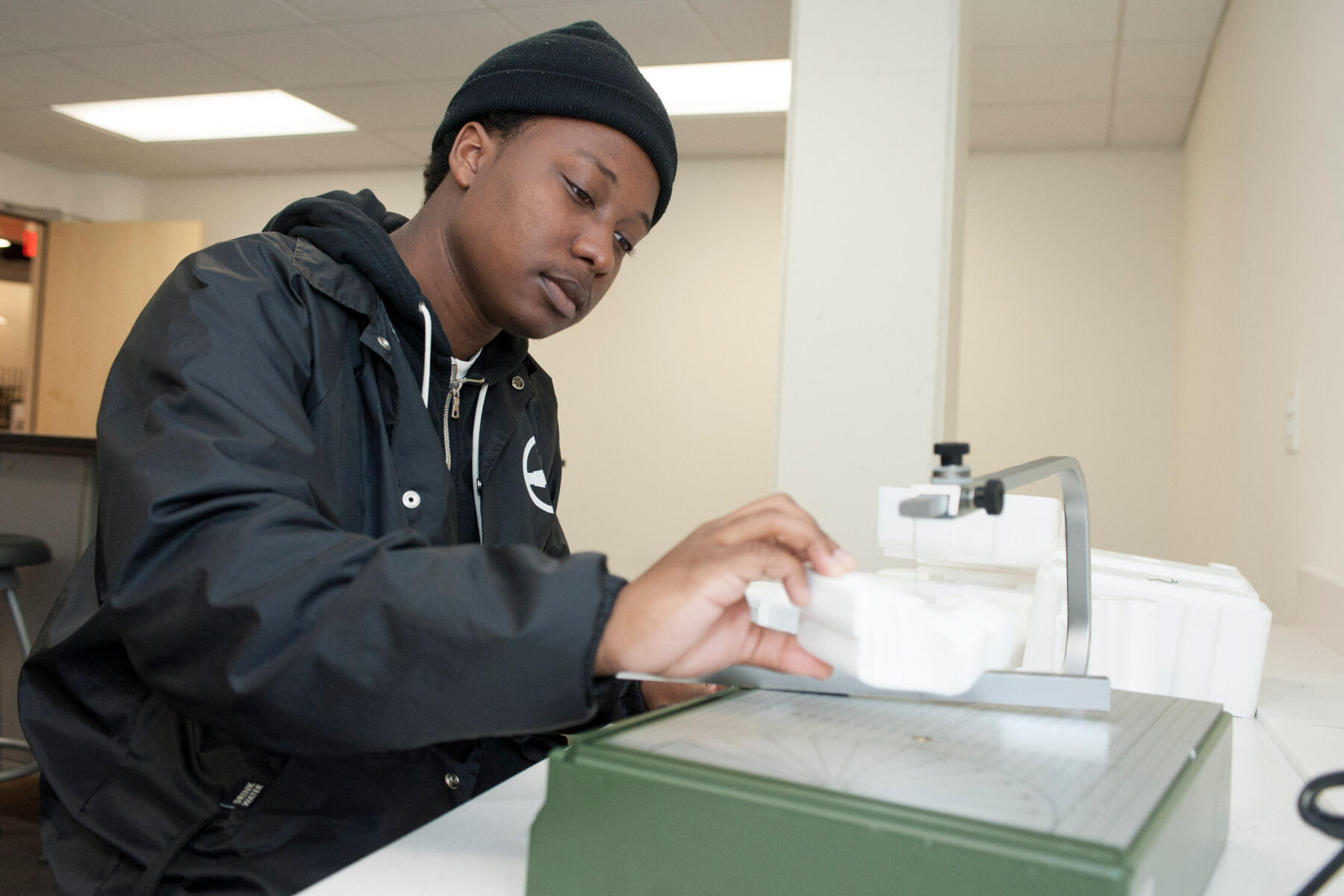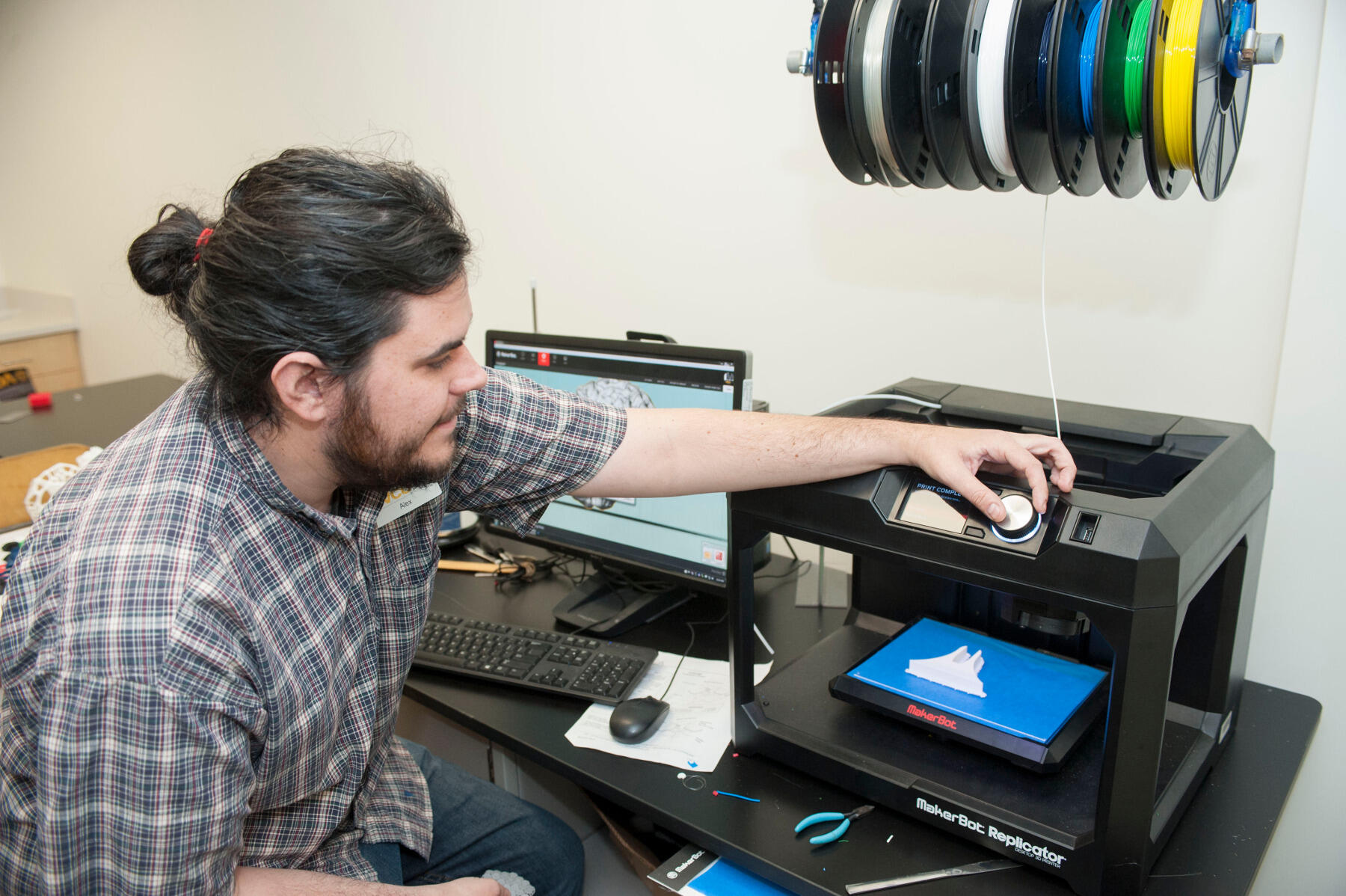
Feb. 2, 2016
New ‘Workshop’ offers 3-D printing, a laser cutter, sewing machines, a 4K video studio and one really, really big video screen
Share this story
Natalie DeMenthon, a junior communication arts and computer science student, loves making costumes, particularly ones inspired by video games. So when VCU Libraries’ new innovative media center opened its doors recently, she decided to try out one of its 3-D printers to fabricate a cosplay prop.
“I used one of the 3-D printers to make a plaster splicer mask from ‘Bioshock,’” said DeMenthon, as she operated a sewing machine in the center’s makerspace. “The pattern was available for free online, so I was like ‘Yes! I’ve got to try this.’”
It’s not just about having fun — though that’s a really good way to learn — it’s about enabling people to create objects that are important to them.
DeMenthon is an innovative media student assistant who works in the Innovative Media Department’s new center, called The Workshop, located on the lower level of James Branch Cabell Library and built as part of VCU Libraries’ $50.8 million expansion and renovation.
The Workshop offers a comprehensive variety of multimedia resources and services, including a 4K video studio, loanable media equipment, an array of video editing and graphic design stations, an audio studio, a video game lounge with six gaming consoles, and a makerspace featuring 3-D printers, a laser cutter, sewing machines, a computerized tabletop router and much more.
“We support any kind of hands-on creation, both digital and analog,” said Eric Johnson, head of innovative media for VCU Libraries. “It’s not just about having fun — though that’s a really good way to learn — it’s about enabling people to create objects that are important to them. It’s about providing tools and expertise to support the scholarly exploration of what I sometimes call ‘multimedia and matter.’”
The Workshop is open to all VCU students, faculty and staff, and it’s aiming to be accessible to both beginners and more experienced users.
“We want to make the technology very approachable. We want to have a low barrier to participation,” Johnson said. “We don’t want someone to walk in and feel like there’s so much high technology that they don’t feel comfortable. But at the same time, we want to support more advanced users, too. We have to make it accessible, but also make sure that we can support a lot of uses.”
The center is available for both class assignments and personal projects, Johnson added.
While The Workshop recently opened, not everything is fully operational yet. For example, the video studio, which will feature 4K cameras on dollies, a wraparound green and blue screen backdrop and studio lighting, will not open until the spring semester. And the makerspace is waiting on several additional 3-D printers, a laser cutter, virtual reality headsets and assorted other pieces of equipment.

Entering the glassed-in space, visitors are greeted by an information desk, at which they can check out equipment, including video cameras (including GoPro Hero cameras, as well as cameras with HD and 3-D capabilities), digital cameras (everything from point-and-shoot to DSLRs), video games, GPS units, digital drawing tablets, projectors, audio recorders, a digital microscope, a telescope, an endoscope and much more. It even features a sound effects library with more than 250 CDs. For a list of available equipment, go to http://www.library.vcu.edu/services/computing/innovative-media/innovative-media-equipment/.
The main area holds a series of workstations with different concentrations, such as video capture and editing, audio capture and editing, 3-D object creation, scanning and graphic design. It also features viewing stations, at which users can watch older media, such as VHS cassette tapes or international DVDs. Coming soon will be workstations to support app and website creation, as well as geographical information systems and mapping.
Basics on the Workshop
Location: Lower Level, Cabell Library (use lobby elevator or lobby stairs) Hours and Fees: Free and open to all students, faculty and staff Help: This space is not just for those experienced in high-tech work. The Workshop has staff — experts and peers — who can help you learn. Ambiance: People can work alone, in teams or in groups. If you have a project in mind and need help, Workshop staff will help match you with a collaborator or help you build a team. Events: Look for special events in The Workshop, including “Wednesdays in The Workshop” and regular demonstrations and discussions about equipment. |
On a wall in the main area is a massive 98-inch video screen with 4K resolution and multitouch and 3-D functionality.
“The idea for this was that our video studio has 4K cameras and student projects will increasingly be going in that direction as the technology gets more affordable. We want to be able to display the quality work that students, faculty and staff have created,” Johnson said. “We can also use this as a lecture space for small groups. And it’ll help us with data visualization, particularly for faculty and grad students. And of course it’ll be useful for interactive display of artistic video work. It’s a very flexible platform that lets us do a lot of things.”
Down a hall, the video game lounge features a 47-inch HDTV, a Sony Playstation 2, 3 and 4, a Microsoft Xbox 360 and Xbox One, and a Nintendo Wii U.
Along with its three full-time employees, The Workshop is staffed by several student workers, who are on hand to provide instruction on any of the equipment and whom Johnson calls “brilliant.”
“We aren’t going to do it for you, but we have people who can teach you and will back you up,” he said.
DeMenthon, for example, is an experienced costume-maker, and enjoys showing others how to work equipment such as The Workshop’s computerized cutting machine, which can cut fabric, paper or vinyl. “I’m so excited about it,” she said. “You can put in any pattern that you want to cut out. You can do really intricate appliques.”

Another student worker, McKinley Dixon, a junior kinetic imaging student, specializes in audio recording and mixing.
“I really like being in an atmosphere where I’m the smartest person in the room but not the smartest person in the room. I might know more about music than [co-worker] Alex [Jones], but Alex knows more about 3-D printing than me,” he said. “I like that I can see something that someone else made, and just walk over and say, ‘Hey, how did you make that? Can you show me?’”

As The Workshop continues to get off the ground, Johnson is hoping that it becomes a hub for VCU’s creative community.
“The library is an intellectual crossroads with a lot of interdisciplinary work,” he said. “So we want to build the community down here of all sorts of people who have an interest in this sort of stuff, whether they’re an engineering student, an arts student, a social sciences student or whoever. We want them all to have a home in a place like this.”
Libraries have always been involved in content access and preservation, as well as in content creation and sharing. A place like The Workshop, Johnson said, is the next logical step.
“This is still very much a library thing,” he said. “We help people share their ideas in ways other than text. Whatever that looks like — it could be 3-D-printed objects, it could an animated video — almost anything that is nontextual, we’re here to help you bring it to light.”
Subscribe for free to the weekly VCU News email newsletter at http://newsletter.news.vcu.edu/ and receive a selection of stories, videos, photos, news clips and event listings in your inbox every Thursday.
Subscribe to VCU News
Subscribe to VCU News at newsletter.vcu.edu and receive a selection of stories, videos, photos, news clips and event listings in your inbox.










